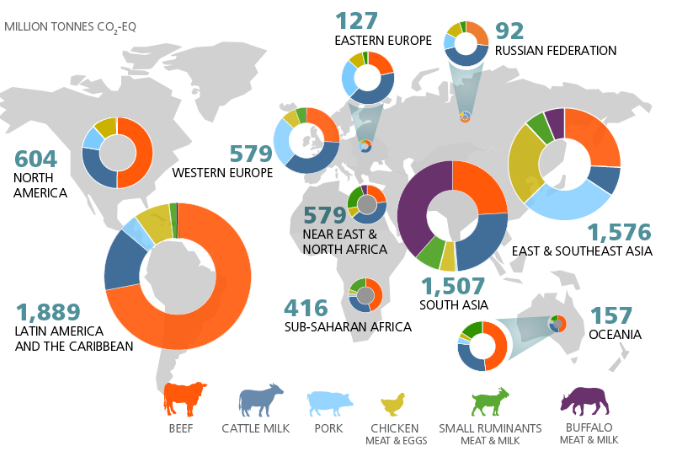Farmed livestock are responsible for 14.5% of all emissions related to human activity, and cows make up by far the largest proportion of that. Although vegan diets are on the rise in countries like the UK and US, and meat alternatives are increasingly available, cattle farming is still widespread.
So attention has turned to putting a cork in the volume of methane cows produce, by targeting their gut microbes.
Researchers looked at more than 1,000 cows on farms throughout Europe, and found they had a large proportion of their gut bacteria in common. By inoculating calves with targeted probiotics, the scientists suggest the mix of microbes could be altered, and the volume of methane produced limited. By eliminating the worst-offending gut bacteria, emissions could be cut in half, they say.
 Are cows the new coal? Chowing down on meat alternatives
Are cows the new coal? Chowing down on meat alternatives
Livestock production around the world.
Environmentally friendly cows?
The researchers say the gas-causing bacteria in cows’ digestive systems are linked to their genetic make-up. Longer-term, this could mean some of the most problematic microbes could potentially be eliminated by selective breeding.
Previous studies have suggested mixing seaweed into cattle feed could also be a way to cut the volume of methane produced. And it might also help cows grow bigger and stronger. However, there are still questions about how this might work in reality: growing seaweed on the scale necessary is likely to be problematic and environmentally damaging in itself.
Can feeding seaweed to cows help fight climate change?
Ruminating about cow guts
Failure to mitigate the effects of climate change is one of the primary threats facing the planet, according to the World Economic Forum's Global Risks Report. And methane is one of the biggest causes of the problem, after the more commonly discussed carbon dioxide.
Given the pure number of cows in the world, farmed for beef and milk, intrepid scientists have spent a lot of time investigating their burps and belches.
But unfortunately, it would seem these aren’t the only bovine emissions we need to concern ourselves with – cattle urine is also a climate offender. It releases nitrous oxide, another harmful gas, particularly in poor-quality pastures, new research has demonstrated.

















